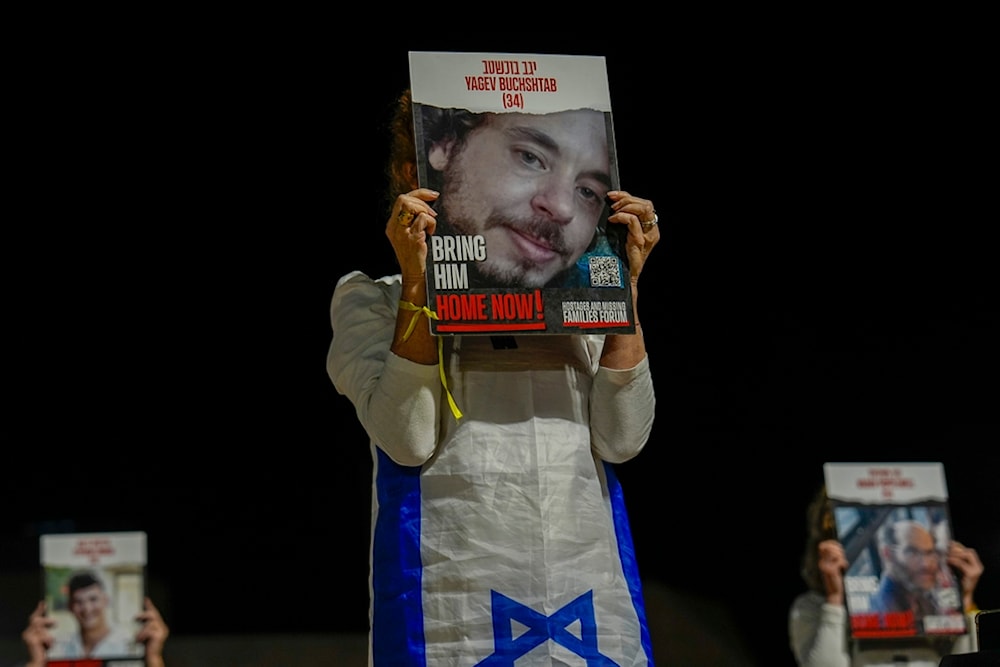Families of captives call for radical shift in regime's strategy: NYT
They believe that political negotiations are the only viable solution to secure the safe release of remaining captives.
-

Families and supporters of Israeli captives hold their photos and shout slogans during a rally calling for their release, in "Tel Aviv", occupied Palestine, Saturday, Dec. 30, 2023 (AP)
Following the death of three Israeli escapees who got accidentally killed by Israeli forces in December, the New York Times detailed in a report on Friday that public sentiment in Israeli society is shifting from grief to indignation.
It details that families of released captives, critical of the regime's handling, are advocating for a political approach to secure the remaining captives. This is owed to the fact that the indiscriminate bombing of the Gaza Strip has raised concerns for captives and their families.
These families not only symbolize the perceived failure of the Israeli regime to safeguard its citizens but have also emerged as a prominent advocacy group, pushing for a political solution to secure the release of the remaining captives, noting that solely relying on military actions is insufficient.
Interestingly, the Israelis who were released from captivity have formed a unique group of advocacy. Having experienced Israeli airstrikes while being held in Gaza, some now possess a small sense of what Gazans are enduring.
This has created a major shift in perspective, with some released captives expressing concerns to the Israeli cabinet that the military offensive might jeopardize the safety of those still held in Gaza.
Read more: Three missing Israelis located in Gaza, captive number rises to 136
Despite the regime facing challenges in pursuing its military objectives and securing the safe release of captives, the families of captives are advocating for political negotiations as the only viable solution.
They have consistently maintained that there can be no victory without the safe return of all captives. Accusations have been raised that the regime gave up on the captives when it resumed its aggression after a brief ceasefire and prisoner exchange.
As the war drags on with the regime claiming tactical successes, including the destruction of tunnels and targeting resistance fighters, there is a growing sense that these "achievements" have not translated into a strategic breakthrough.
The families of captives are urging the regime to negotiate for their release, emphasizing that "sacrifices and concessions", including releasing Palestinian prisoners, may be necessary.
The regime's lack of a defined endgame further raises questions about the feasibility of achieving both the destruction of the Palestinian resistance and the safe return of captives.
Families are calling for a radical shift towards political engagement, presenting Israelis with a choice between ongoing war or pursuing a more pragmatic outcome through negotiations.
The leadership of the Palestinian resistance has consistently affirmed that the return of the Israeli captives will not take place until a comprehensive ceasefire is achieved and all Palestinian prisoners are liberated from Israeli occupation prisons.
Several Israeli captives lost their lives due to occupation gunfire, while others were released in a prisoner-captive exchange that occurred during a temporary ceasefire in the conflict.
Two days earlier, Al-Nasser Salah al-Din Brigades, the military wing of the Popular Resistance Committees, said that as a result of the Israeli bombing, the brigades lost contact with one of the groups responsible for Israeli captives being held in Gaza.
The brigades stressed that this occurred due to the brutal bombardment by the Israeli occupation forces on the Gaza Strip, on New Year's Eve of 2024.
Similarly, earlier in December the military wing of the Hamas Resistance movement, the al-Qassam Brigades, announced having lost contact with a group of Resistance fighters guarding five Israeli settlers as a result of the brutal Israeli aggression on the Gaza Strip.
Read more: 'Israel' drops equivalent to 3 Hiroshima nuclear bombs on Gaza

 4 Min Read
4 Min Read








